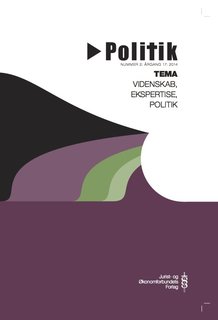Madborgerskab? Når videnskab møder hverdagspraksis
DOI:
https://doi.org/10.7146/politik.v17i2.27579Resumé
Food is an ordinary practice in everyday life. At the same time, food practices become politicised through at- tempts to regulate food related collective problems such as health, risk and climate by way of encouraging self- disciplining and normative regulation of everyday habits among citizens. Such regulatory technologies cover medialised change communication, and in the food eld, such communication often builds upon scienti c knowledge and arguments. us, when citizens relate to such communication, links between complicated scienti c knowledges and everyday translations are produced. Building on a practice theoretical approach, the article shows three empirically based ways in which Danish citizens handle scienti cally based change communication on food in their daily lives: Empowerment, resistance towards disciplining, and do-ability. e typology demonstrates that citizenship in the scienti cally based politicised food eld – „food-izenship“ – is more varied and compound than presumed in the existing approaches to change communication and the Public Understanding of Science literature.
Downloads
Publiceret
Citation/Eksport
Nummer
Sektion
Licens
Forfattere, der publicerer deres værker via dette tidsskrift, accepterer følgende vilkår:
- Forfattere bevarer deres ophavsret og giver tidsskriftet ret til første publicering, samtidigt med at værket er omfattet af en Creative Commons Attribution-licens, der giver andre ret til at dele værket med en anerkendelse af værkets forfatter og første publicering i nærværende tidsskrift.
- Forfattere kan indgå flere separate kontraktlige aftaler om ikke-eksklusiv distribution af tidsskriftets publicerede version af værket (f.eks. sende det til et institutionslager eller udgive det i en bog), med en anerkendelse af værkets første publicering i nærværende tidsskrift.
- Forfattere har ret til og opfordres til at publicere deres værker online (f.eks. i institutionslagre eller på deres websted) forud for og under manuskriptprocessen, da dette kan føre til produktive udvekslinger, samt tidligere og større citater fra publicerede værker (se The Effect of Open Access).

